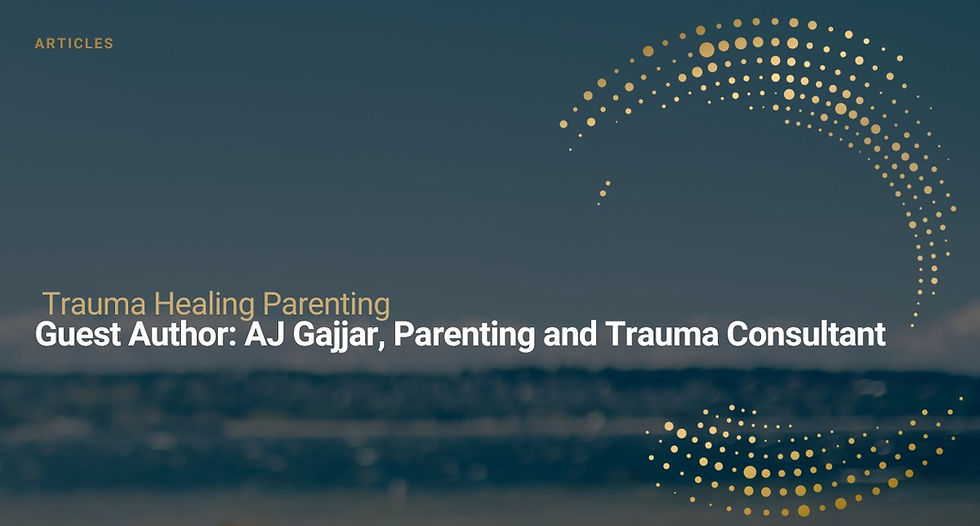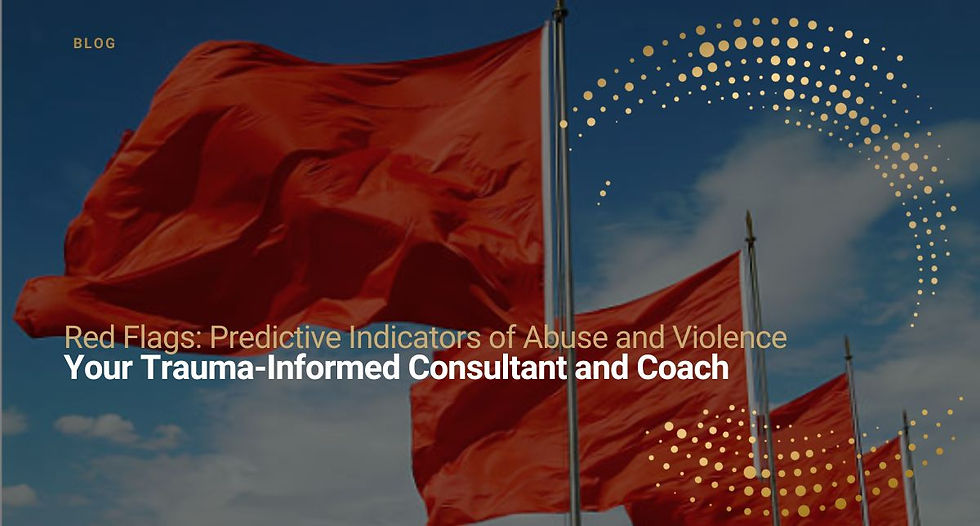Trauma Healing Parent
- themothercorp
- Nov 22, 2024
- 5 min read


At The Mother Corp., we believe in amplifying knowledge and fostering meaningful education to support healing and growth. To deepen your understanding of trauma-informed practices and approaches, we are thrilled to introduce guest writers on our blog. These contributors bring diverse expertise, lived experiences, and professional insights to enrich our collective learning.
Their voices provide valuable perspectives on trauma recovery, empowerment, and navigating complex systems. Together, we aim to create a space where education meets compassion.
Guest writers allow us to spotlight incredible voices and their impactful contributions. We are honoured to share their expertise with you.
Today we are featuring AJ Gajjar, Parenting and Trauma Consultant in Alberta, Canada.
Co-parenting offers the best long-term outcomes for children of divorce. This I what the research shows and I stand by it. The key however is that it needs to be healthy co-parenting. Healthy, in terms of both parents’ psychological and emotional well-being, and both holding the best interests of their children as priority.
What happens then, when one parent is NOT psychologically or emotionally healthy? When one parent is high-conflict, or has a personality disorder, abusive, struggles with addiction, or is relationally complex, and is either unwilling or just does not have the capacity to co-parent?
I have seen many parents struggle through trying to co-parent and try everything they can to establish a healthy co-parenting relationship unsuccessfully. They end up stuck in feelings of guilt and shame because they just can’t seem to co-parent well. When friends, family, legal professionals, therapists – when everyone is telling you to co-parent but you can’t seem to get it right, what then?
Here’s the thing. If you keep trying to co-parent with someone who does not have the capacity to, you are actually causing more harm to your children. Your energy is focused on the conflict, thoughts, actions, and responses of the other parent and not on your children. You’re distracted, and not present.
The other parent, due to their own challenges is also not present, also not able to meet the needs of the children, and often causes overt harm. These children now have 2 distracted parents who cannot meet their needs and are not emotionally present. (At least not as much as they could be).
So what does a parent do?
This is where I offer an alternative. That alternative, is Trauma Healing Parenting.
Trauma Healing Parenting, is rooted in attachment research, neurobiological development, childhood trauma research, and developmental psychology. A parenting approach that teaches how to both heal the trauma your child is experiencing, and also build resiliency to protect them from future ongoing experiences of trauma.
Have you gotten your free The Mother Corp. Self-Care Guide? Grab it now!

I say “ongoing” trauma, because due to the legal system and their decisions which we are forced to abide by, as long as these children are spending time with the maladaptive parent, these children will continue to experience harm at the hands of that parent.
The system we are living with is based on parental right, with little to no regard for the voice of the child or the child’s best interest. DESPITE what the black and white letter of the law might state.
Protective parents are faced with the unimaginable reality of sending their children off to a psychologically and emotionally and sometimes physically unhealthy and abusive environment, where they know their children are going to experience abuse, and are not going to thrive.
It is in these specific situations that Trauma Healing Parenting can provide hope.
It can support these children through their experience of being placed in a less than healthy, traumatic environment repeatedly, week after week after week.
This is NOT your old school parenting model. This is child-centric, relational Parenting 2.0.
It’s parenting that holds the relationship with your child as sacred, and central to everything you do.
It looks at the relationship from a Trauma Healing lens.
It creates a Trauma Healing environment – both relationally and environmentally.
It maintains the Trauma Healing environment through establishing boundaries and communication strategies which minimize conflict and other distractions which would otherwise take your focus away from your parenting.
So how do you parent from a Trauma Healing lens?
The first step is to shift our focus away from what the maladaptive parent is or is not doing.
It’s important to get crystal clear on what we can and, I would argue more importantly, what we CAN’T control within this situation.
Once we get clear on that, then we can focus our time and attention on things that we can influence.
Second, focus on the relationship that you have with your children. Parenting children through high-conflict divorce and who are experiencing maladaptive parenting, is unlike any other. Unfortunately we do not have the luxury of parenting in the way “we want” to parent. We are going to parent in the way our children NEED us to parent. And this involves being attuned and responsive to their needs.
Being responsive to their needs comes from both a relational and environmental perspective. From a relational standpoint, these children will depend on stability and reliability in your mood and affect so they know what to expect from you. From an environmental lens they will need consistency, predictability, boundaries and expectations. These kiddos tend to struggle with change and do not appreciate unexpected situations. Of course, despite our best efforts, we are not going to get it right 100% of the time. And that is where the importance of repair and reconnect come in.
Being honest and making repairs with your children is crucial to maintain a sense of safety within the relationship and also to help the relationship grow and evolve. We can admit we are not perfect, and adults also make mistakes sometimes. And we also have the opportunity to model the importance of apology to them – in a way that normalizes making mistakes and can contribute a growth mindset.
Trauma Healing Parenting is NOT co-parenting. In fact, it has nothing to do with the other parent. But it has everything to do with YOUR relationship with YOUR children.
It teaches you to Parent Differently, and in a way these children desperately need to ensure healthy emotional and psychological growth and development, and to minimize the probability of negative long-term outcomes that these children may otherwise likely face.
Trauma Healing Parenting is not easy. It requires dedication, time, and an unrelenting resolve to do whatever it is you need to do to provide your children with the opportunity to be healthy and Thrive.
Go to www.thetramahealingparent.com for more information.

AJ Gajjar is a Parenting and Trauma Consultant, child development specialist, and children's advocate.
She supports professionals within the domestic violence, family law, children's mental health and child protection sectors to recognize the detrimental effects of domestic violence, high-conflict divorce and maladaptive parenting on children.
AJ also supports concerned parents, to best protect and empower their children not only to recover from trauma, but also to develop resilience against future traumas.
Having combined her education in Developmental Psychology, over 18 years' of experience in early child development and mental health, along with her lived experience, AJ has created Trauma Healing Parenting, a parenting model specifically designed to best support children who experience ongoing relational harm.

As trauma-informed coaches and consultants, we work with people, often parents, navigating high-conflict separations and divorce. We have expertise in addressing gender-based violence, hidden abuse, financial abuse, post-separation abuse, and the transition from parenting to co-parenting.
We look forward to welcoming more guest authors in the future to share their unique insights and expertise. If you're interested in partnering with The Mother Corp. as a guest writer, we’d love to hear from you. Get in touch to collaborate and contribute to our growing community.
We'd love it if you joined us on our newsletter: https://www.themothercorp.com/subscribe



Comments